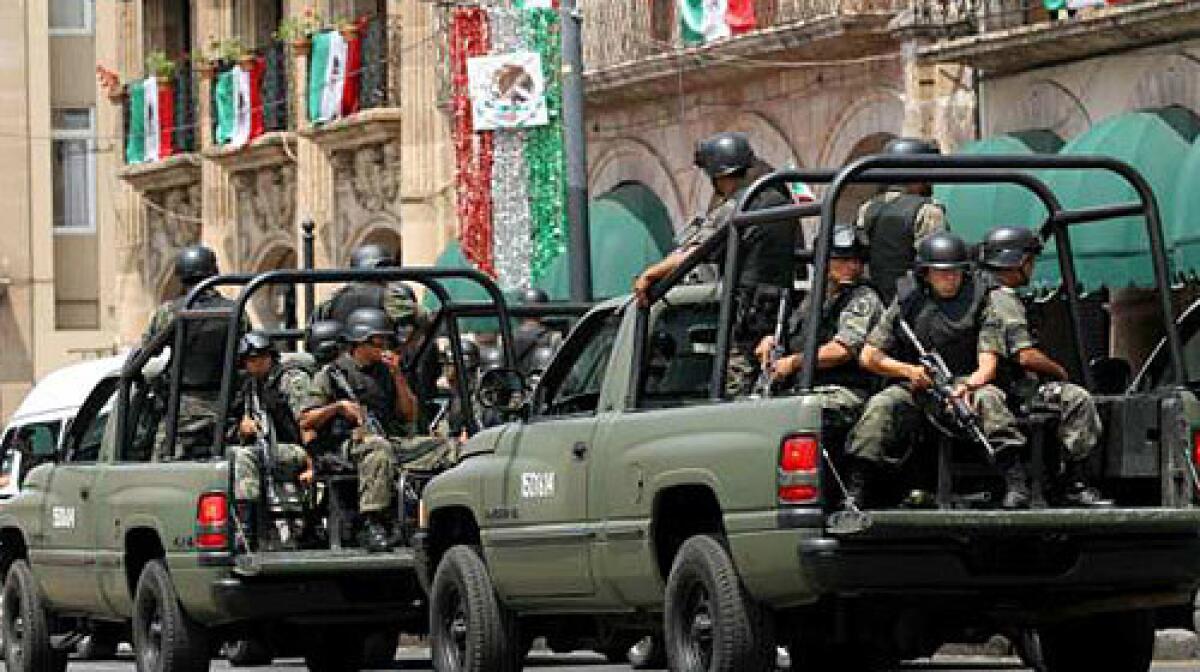Mexico’s President Calderon has few choices in drug war

MEXICO CITY — Stretched thin in an uphill battle against drug gangs, the government of Mexican President Felipe Calderon faces increasingly stark options at a pivotal moment.
A fatal Sept. 15 grenade attack on civilians in western Mexico, coming on top of a steadily rising death toll nationwide, drastically altered the stakes in the nearly 2-year-old crackdown.
Calderon now has little room to pull back without appearing beaten. But the attack, which killed eight people during an Independence Day celebration in Calderon’s home state of Michoacan, is testing the public’s stomach for the increasingly savage conflict.
“The violence is not going to stop soon. There will be more actions,” political analyst Alfonso Zarate warned last week in the daily El Universal newspaper. “However, neither the government nor the public can turn back.”
The crisis has reopened debate over alternatives, including legalizing drugs. Many Mexicans wonder aloud whether Calderon should revert to the practices of earlier governments, led by the Institutional Revolutionary Party, that tolerated traffickers as long as they kept the killings of noncombatants down and bribes up.
Calderon’s aides have publicly ruled out any peace deals with the drug underworld.
“There are two options: to fight it or not fight it,” security analyst Jorge Chabat wrote in El Universal last week.
Walking away from the battle would worsen corruption and could leave the Mexican government critically weakened, he said. Staying with the crackdown will almost surely mean more bloodshed.
Turf wars among drug-trafficking groups have killed more than 3,000 people this year, according to news reports, aggravating public anxiety over a rising rate of kidnappings and other crimes.
Since the Sept. 15 attack in Morelia, the president and top aides have vowed to continue their crackdown and urged residents to unite against a foe they say threatens national security.
The administration already had deployed 40,000 soldiers and 5,000 federal police officers as part of its nationwide campaign, which began shortly after Calderon’s inauguration in December 2006. The offensive has yielded several high-profile arrests and major seizures of drugs and money, including a recent $26.2-million haul in northern Sinaloa state.
“From the start of his administration, when he proposed this as a priority, President Calderon indicated clearly that this was going to be a long-term battle,” Atty. Gen. Eduardo Medina Mora said in a television interview last week.
During a visit to New York on Sept. 23, Calderon again called on the United States to help by stanching the cross-border flow of arms into his country. He also said Mexico was “paying a very high price” for U.S. drug consumption.
But in raising the specter of a possible terrorism campaign, the grenade attack has left Mexicans feeling more at risk than at any time since Calderon launched the offensive.
Mexican authorities Friday announced the arrests of three men suspected of carrying out the attack. They were said to be members of the Zetas, the armed wing of the so-called Gulf Cartel that has decapitated rivals and carried out scores of other killings.
Although polls show most Mexicans support the crackdown, they also indicate that people increasingly question whether this type of campaign can succeed.
The administration acknowledged during a congressional hearing last week that the intelligence service lacks the agents and information-gathering capacity for a nationwide campaign against organized crime.
Interior Secretary Juan Camilo Mouriño also confirmed what everybody already suspected: that drug gangs have infiltrated police forces so thoroughly that authorities can’t fully guarantee public safety. And he expressed concern that drug money could make its way into midterm congressional elections in July.
The election campaign may complicate matters for Calderon in other ways, by sharpening criticism over his anti-crime strategy and giving political foes opportunities to grandstand.
When Mouriño, Medina Mora and Genaro Garcia Luna, the nation’s public safety chief, appeared before Congress last week, opposition lawmakers jeered and held up signs saying, “Resign.”
The leftist Democratic Revolution Party, which holds the second-highest number of seats in the lower house of Congress, refuses to recognize Calderon as president, saying his 2006 election victory was fraudulent. Many leftists believe Calderon launched the drug crackdown to gain legitimacy after the disputed vote count.
Public opinion remains a wild card. In a poll in the Milenio newspaper last week, two-thirds of respondents said they were afraid to go to public places after the grenade attack.
More to Read
Sign up for Essential California
The most important California stories and recommendations in your inbox every morning.
You may occasionally receive promotional content from the Los Angeles Times.










